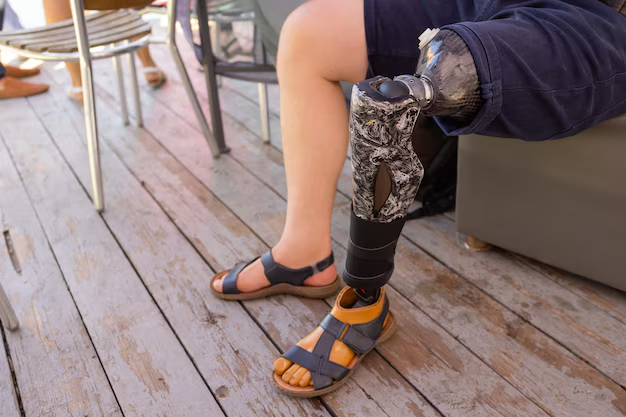Your Guide to Does Medicare Cover Orthotics
What You Get:
Free Guide
Free, helpful information about Medicare Insurance and related Does Medicare Cover Orthotics topics.
Helpful Information
Get clear and easy-to-understand details about Does Medicare Cover Orthotics topics and resources.
Personalized Offers
Answer a few optional questions to receive offers or information related to Medicare Insurance. The survey is optional and not required to access your free guide.
Does Medicare Pay for Orthotics? Here’s What You Need to Know
Navigating the world of healthcare coverage, especially when it involves something specific like orthotics, can be complicated. Orthotics, essential for those needing additional support or correction for foot-related issues, may be necessary for improving mobility and quality of life. If you're wondering whether Medicare covers orthotics, you're not alone. Here's a clear breakdown to help you understand what to expect.
Understanding Medicare Coverage for Orthotics
Medicare can indeed cover orthotics, but the coverage is not universal or automatic. The coverage depends on the type of orthotics and which part of Medicare you're enrolled in. Here’s a quick overview:
Medicare Part B (Medical Insurance): This part covers durable medical equipment (DME), which may include orthotics like braces for the neck, back, or limb. For the coverage to kick in, a doctor must prescribe the orthotic as medically necessary for treating your specific condition.
Medicare Part A (Hospital Insurance): Coverage under this plan might include orthotics if provided in a hospital or skilled nursing facility as part of inpatient care.
Medicare Advantage Plans (Part C): These plans offer what Original Medicare does (Parts A and B) but may include additional benefits such as expanded orthotics coverage. Coverage details can vary significantly, so checking with your specific plan provider is essential.
Despite these options, there’s often a 20% coinsurance cost, with the Part B deductible also applying. Additionally, the supplier of the orthotic must accept Medicare assignment for the costs to be covered.
How to Access Financial Assistance for Orthotics
Orthotics can be expensive, potentially placing a burden on seniors and others reliant on Medicare. Fortunately, some resources and programs can help alleviate financial stress:
Government Aid Programs
Programs like Medicaid, especially if you’re eligible due to financial constraints, can supplement Medicare and cover additional orthotic expenses.
Non-Profit Organizations
Certain non-profits offer financial assistance for medical supplies, including orthotics. Organizations may work specifically with senior citizens or individuals with disabilities.
Supplemental Insurance
Medicare Supplement Insurance (Medigap) can help cover the costs not paid by Medicare. While this may not directly cover orthotics, it can minimize out-of-pocket expenses for beneficiaries.
Explore Broader Financial Solutions
Considering the tight economic situation many face, expanding your knowledge to include financial solutions that might indirectly support your healthcare needs can be wise.
Debt Relief Programs: These can assist in managing overall financial burdens, freeing up resources for health needs.
Educational Grants: If you’re considering retraining or need new skills due to changing abilities, educational grants could open up useful opportunities.
Credit Card Solutions: Look for credit cards with 0% introductory APR offers to help manage high medical costs without extra interest.
Each person's situation is unique, and it’s beneficial to explore numerous options to find the most fitting for your circumstances.
Here’s a concise list to help you navigate available financial support options:
- 🏥 Medicaid: Check eligibility for supplementary coverage.
- 💸 Non-Profit Assistance: Seek funds from organizations focused on health needs.
- 🛡️ Medigap Policies: Investigate to ease out-of-pocket costs.
- 💳 Credit Solutions: Utilize cards with 0% APR introductory offers for large health expenses.
- 📚 Educational Grants: Explore for new career opportunities or skills if forced to shift careers due to health issues.
These resources can ease the financial burden while ensuring that medical needs, like orthotics, are met with financial prudence and strategic planning.
What You Get:
Free Medicare Insurance Guide
Free, helpful information about Does Medicare Cover Orthotics and related resources.

Helpful Information
Get clear, easy-to-understand details about Does Medicare Cover Orthotics topics.

Optional Personalized Offers
Answer a few optional questions to see offers or information related to Medicare Insurance. Participation is not required to get your free guide.


Discover More
- Am I Elgible For Medicare
- Am I Enrolled In Medicare
- Am I Qualified For Medicare
- Are Adult Diapers Covered By Medicare
- Are Chemotherapy Drugs Covered By Medicare Part d
- Are Colonoscopies Covered By Medicare
- Are Covid Tests Covered By Medicare
- Are Cpap Machines Covered By Medicare
- Are Cpap Supplies Covered By Medicare
- Are Dental Implants Covered By Medicare
